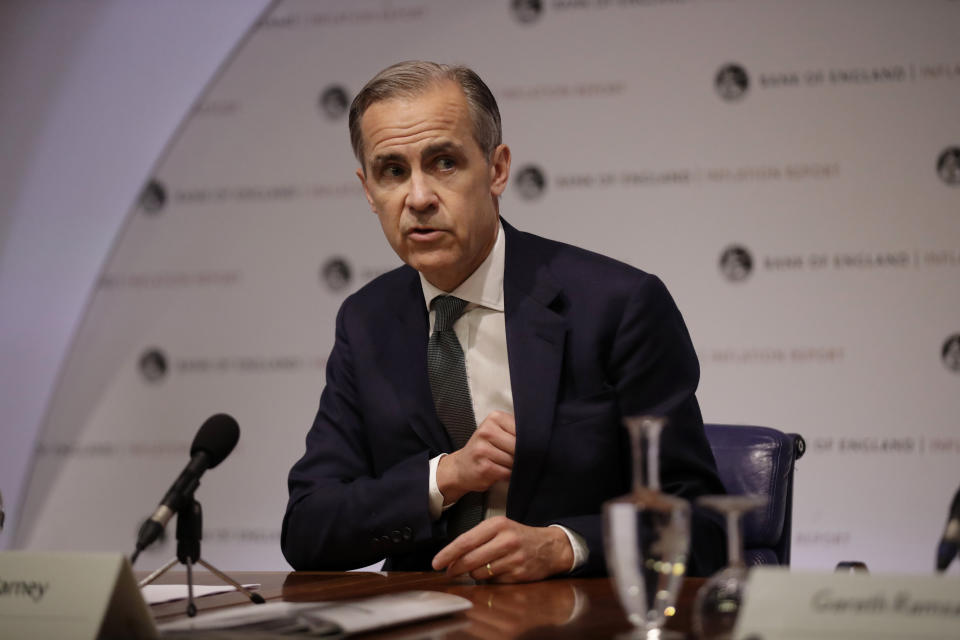Bank of England holds rates steady and slashes growth forecasts

As expected, the Bank of England on Thursday held its base interest rate at 0.75%, despite rising pressure on inflation from the stark fall in the value of the pound.
The bank cut its growth forecasts for 2019 and 2020 to just 1.3%, while increasing its expectations of growth in 2021 to 2.3%.
It said there was a 33% chance of negative growth by the beginning of 2020, something that will prompt recession fears.
The unanimous decision by the central bank’s monetary policy committee to leave rates unchanged comes against a backdrop of rising fears of a no-deal Brexit.
The increased risk of such a scenario, the bank said on Thursday, had resulted in a “marked depreciation of the sterling exchange rate”.
The pound had its worst month since October 2016 in July, and on Thursday plunged below $1.21 for the first time since January 2017.
The steep fall-off in the value of the currency threatens to push up inflation — something that would normally prompt the bank to vote to hike interest rates.
Inflation in the UK is currently at the bank’s 2% target and the bank predicts it will exceed its target in two to three years, it said on Thursday.
READ MORE: UK house prices are stuck in ‘Brexit limbo’
But the bank would be expected to ease monetary policy — by lowering interest rates — in the event of a no-deal Brexit in order to boost the economy.
While noting that Brexit-related developments such as stockpiling were making economic data from the UK “volatile”, it said that there appeared to be a slowdown in underlying growth.
That slowdown, the bank said, was “reflecting both the impact of intensifying Brexit-related uncertainties on business investment and weaker global growth on net trade”.
Wait-and-see mode
It said that, depending on the outcome of Brexit, the UK’s economy “could follow a wide range of paths over coming years” and noted that its policy will depend on several factors.
“The monetary policy response to Brexit, whatever form it takes, will not be automatic and could be in either direction,” the bank said.
The bank’s governor, Mark Carney, said on Thursday that the bank “will take all appropriate measures to support jobs and activity consistent with achieving the 2% inflation target during these exceptional times.”
He said that the likelihood of massive stimulus measures after a no-deal Brexit depended on what that scenario looked like, noting that there were “limits” to what it could do.
But the monetary policy committee once again stated that, assuming there will be a “smooth Brexit and some recovery in global growth”, it thinks that interest rates will be increased “at a gradual pace and to a limited extent”.
“Policymakers are understandably in wait-and-see mode, until the shape of Brexit becomes clearer”, said Ben Brettell, a senior economist at Hargreaves Lansdown, on Thursday.
READ MORE: UK manufacturers 'suffocating' after biggest fall in production
“The significantly cheaper pound is a rising threat for inflation in Britain,” said Ipek Ozkardeskaya, a senior market analyst at London Capital Group, in a note, noting that the policymakers have “a hard task”.
“In one hand, they should give the necessary support to the UK’s economy threatened by a messy Brexit and a knee-jerk economic shock in the immediate aftermath of the separation that could happen as early as 31 October.”
On the other hand, he noted, the “stiff depreciation” in the value of the pound gives them little room for manoeuvre.
But the inflation target “will always play second fiddle” to the need to support the economy in a crisis, said Brettell, noting that inflation hit 5% after the financial crash.
The decision comes after the US Federal Reserve on Wednesday voted to cut interest rates for the first time since the 2008 financial crisis, and as the European Central Bank last month signalled that it was preparing to ease monetary policy.
Though Federal Reserve chair Jerome Powell said it was not the last rate cut, markets were disappointed by the bank’s neutral tone.

 Yahoo Finance
Yahoo Finance 
